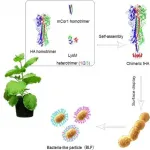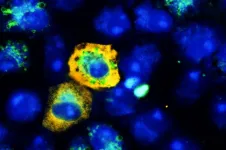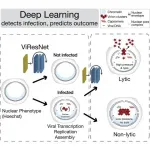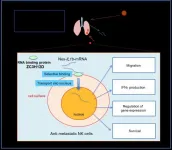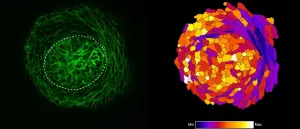(Press-News.org) Scientists studying a common childhood cancer have made a major breakthrough which could lead to a cure for some youngsters who would not have survived the condition.
An international study, involving Newcastle University, UK, has for the first time found a genetic marker in tumours from patients with high-risk neuroblastoma.
Research, published in the Journal of Clinical Oncology, has identified that alterations in the neuroblastoma's ALK (anaplastic lymphoma kinase) gene are associated with a significantly poorer prognosis for children with high-risk disease.
Experts say that by identifying this important genetic marker it means patients should be put on ALK inhibitors at the time of diagnosis with the hope of a cure.
Personalised treatment
Professor Deborah Tweddle, from the Newcastle University Centre for Cancer and Honorary Consultant at The Newcastle Hospitals NHS Foundation Trust, led the UK part of the study.
She said: "By identifying ALK as a genetic marker associated with the likelihood of a poorer outcome within the high-risk group of patients, it means we can treat these patients differently from the outset.
"Most excitingly there are new treatments that target the ALK protein itself, used in other cancers that can now be used for patients with high-risk neuroblastoma with ALK gene abnormalities.
"This research is an excellent example of personalised medicine. By treating those patients with an ALK genetic abnormality with an ALK inhibitor we are tailoring the treatment to the patients' individual tumour type.
"By combining an ALK inhibitor with the other treatments we currently give for high-risk neuroblastoma we hope to be able to cure more patients with this aggressive childhood cancer."
Neuroblastoma is a cancer of the nervous system that mainly affects children under five. It often begins in the adrenal gland, but in around half of cases has spread throughout the body when it is diagnosed - in these high-risk cases survival is only approximately 50 percent.
Sadly, barely half of the children live beyond five years after diagnosis, despite treatment including high dose chemotherapy, surgery, radiotherapy and immunotherapy.
Several European countries took part in the study and the UK-arm of the trial has been based at Newcastle University with the test being carried out within the Newcastle Genetics Lab, supported by grants from Solving Kids Cancer and Neuroblastoma UK.
Study's findings
Experts carried out ALK testing on as many neuroblastomas as possible from patients treated on the high-risk trial and pooled this data with that from national genetic reference labs from 19 other countries.
The study showed that ALK mutations are present in about 14% of patients newly diagnosed with high-risk neuroblastoma, and nearly 4% have amplification of this gene.
More importantly, these abnormalities are associated with a lower rate of survival and they are therefore important prognostic markers that could be targeted by treatment.
Professor Tweddle added: "As part of the next European clinical trial for high-risk neuroblastoma, we are going to treat all patients with an ALK abnormality found in their tumour with an ALK inhibitor in addition to standard treatment."
The breakthrough comes at the launch of the Newcastle University Cancer Fund, a new fundraising effort to inspire the next generation of cancer researchers to train and work at Newcastle for the benefit of people living with cancer locally as well as sending their research worldwide.
The Fund will work with cancer researchers at the very earliest stages of their studies and see them through to the point where they become established cancer researchers.
Patient case study
Happy schoolboy, Alexander Mohammed, is living life to the full as he enjoys fishing and outdoor activities with his family.
But five years ago, it was a very different story as the youngster, of Gosforth, Newcastle, was given the devastating diagnosis of neuroblastoma.
For almost two years Alexander had intensive treatment which included many aggressive cycles of chemotherapy at the Great North Children's Hospital in Newcastle.
The 10-year-old is now in remission and is monitored every six months under the care of Professor Deborah Tweddle.
Alexander's dad Raphael, a doctor, 43, said: "When Alexander was diagnosed with cancer it was such a shock and not something that we were expecting as he did not have the classic symptoms of neuroblastoma.
"It was difficult to watch him go through the intensive treatment, but he was so brave and to see how well he is doing now is fantastic as he has been in remission for four years.
"To hear of this major breakthrough into the treatment of the condition for children offers real hope of personalised treatment options in the future so that more youngsters lives can be saved."
INFORMATION:
Reference
Frequency and Prognostic Impact of ALK Amplifications and Mutations in the European Neuroblastoma Study Group (SIOPEN) High-Risk Neuroblastoma Trial (HR-NBL1). Angela Bellini et al. Journal of Clinical Oncology. DOI: 10.1200/JCO.21.00086
Drugs routinely used during fertility treatments to release eggs do not increase the risk of developing breast cancer, new research has shown.
Researchers from King's College London, in partnership with King's Fertility, analysed studies involving 1.8 million women undergoing fertility treatments. These women were followed up in studies for an average period of 27 years and had no increase in the risk of developing breast cancer.
The research, published today in Fertility and Sterility journal, is the largest study to date assessing whether commonly used fertility drugs are for a cancer risk for women.
Fertility treatments can range from using medications to boost the release of an egg in a women's natural cycle to more complex ...
A study by the University of Liverpool has shown that while asymptomatic COVID-19 testing in Liverpool was popular, significant inequalities were evident between those who got tested and those who didn't.
Published in the journal The Lancet Regional Health - Europe, the study found that 43% of residents aged over 5 years (n = 214 525) took up the offer of free testing for people without symptoms of COVID-19 between 6th November 2020 and 31st January 2021. A total of 1.3% of tests were positive, meaning that 5192 individuals who did not know they had the virus were notified ...
The avian influenza, an acute viral infectious disease that occurs in poultry such as chickens, ducks, and migratory birds, has been reported to be transmittable to humans. It is difficult to control because it spreads among migratory birds that travel to China, Europe, and elsewhere. Once it is transmitted, it spreads rapidly. Disposing infected livestock is not only costly, but also a cause of serious environmental pollution. This is why vaccines against infectious diseases are imperative. To this, a research team in Korea has recently developed a plant-based, adjuvant-free, recombinant protein vaccine that exhibits a strong immune response.
Professor ...
Researchers from the German Center for Infection Research (DZIF) at Charité - Universitätsmedizin Berlin and the University of Bonn have examined the way in which SARS-CoV-2 reprograms the metabolism of the host cell in order to gain an overall advantage. According to their report in Nature Communications*, the researchers were able to identify four substances which inhibit SARS-CoV-2 replication in the host cell: spermine and spermidine, substances naturally found in the body; MK-2206, an experimental cancer drug; and niclosamide, a tapeworm drug. Charité is currently conducting a trial to determine whether niclosamide is also effective against COVID-19 in humans.
Viral replication depends on host cell machinery and ...
A blood test that can detect tiny amounts of circulating cancer DNA may be able to identify risk of cancer recurrence and guide precision treatment in bladder cancer following surgery, according to a clinical study led by Professor Tom Powles from Queen Mary University of London and Barts Health NHS Trust. The findings from the study, published in Nature, may change our understanding of cancer care following surgery.
The study found that patients with urothelial cancer who had a particular cancer DNA marker in their blood following surgery to remove their tumour had a higher likelihood of cancer relapse. These patients could benefit from subsequent treatment with an immunotherapy called atezolizumab.
Globally, ...
In humans, adenoviruses can infect the cells of the respiratory tract, while herpes viruses can infect those of the skin and nervous system. In most cases, this does not lead to the production of new virus particles, as the viruses are suppressed by the immune system. However, adenoviruses and herpes viruses can cause persistent infections that the immune system is unable to completely suppress and that produce viral particles for years. These same viruses can also cause sudden, violent infections where affected cells release large amounts of viruses, such that the infection spreads rapidly. This can lead to serious acute diseases of the lungs or nervous system.
Automatic detection of virus-infected cells
The research group of Urs ...
The authors of new research say supporting children and young people's mental health is as important as supporting their academic progress, and that particular attention should be paid to the fact that some young people have struggled more than others.
Findings from their study, published in the Journal of Affective Disorders, focused on the connections between loneliness, social contact, parental relationships, and the mental health of adolescents aged 11-16 during the first full UK lockdown from March to May 2020.
Their analysis drew on self-reported data from 894 young people who each completed a survey throughout to gauge their experiences of lockdown and its effects on their emotions, relationships, and feelings.
The team from the universities of Bath, Bristol, ...
Hypoxia, or the inadequate oxygenation of a tissue, is a condition occurring frequently in all solid tumours such as melanoma skin cancer. Melanoma cells are not only able to survive oxygen deprivation, but also to use it to their own advantage by hijacking the anti-tumour immune response and developing resistance mechanisms to conventional anti-cancer therapies. A key gene responsible for cancer cell adaptation to hypoxia is HIF-1α (Hypoxia Inducible Factor-1 alpha). Led by Dr Bassam Janji, head of the Tumor Immunotherapy and Microenvironment (TIME) research group at the Luxembourg Institute ...
A research group led by Professor Sachie Hiratsuka, Institute for Biomedical Research, Shinshu University, has found that a specific sequence of messenger RNA (mRNA), which exists outside cells, binds to receptors on the surface of natural killer (NK) cells and is taken up into the nucleus. The group found that NK cells with mRNA uptake are able to enhance their migration activity and interferon gamma production. Furthermore, NK cells incorporating the mRNA showed an inhibitory effect on cancer metastasis in animal experiments.
In recent years, the results of cancer treatment have been improving with the increase of medical ...
Helsinki University research group used live tissue imaging for the first time to visualise the emergence of the mammary gland.
Despite long-standing interest, the cellular mechanisms driving the initiation of mammary gland development have remained elusive for decades, mostly due to technical limitations in studying dynamic cell behaviors in live tissues. Recent advances in microscopic methods and availability of various mouse models allowed the research group of Marja Mikkola from HiLIFE Institute of Biotechnology, University of Helsinki to address this question. This is the first time when live tissue imaging has been used to visualise the emergence of the mammary gland.
Mammary gland is the class-defining organ of mammals, yet we know surprisingly little how its ...
